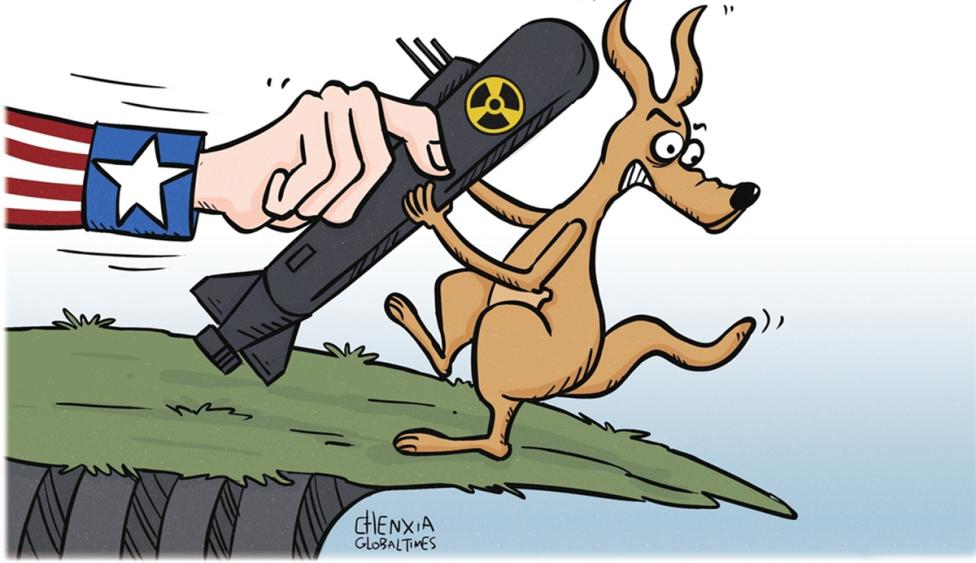2025年6月12日,华东师范大学澳大利亚研究中心主任陈弘接受《环球时报》英文版采访,谈特朗普政府对“奥库斯”进行评估,有可能放弃该三方协议。
US reviews AUKUS to fit ‘America First’ agenda, a tactic to squeeze profits from allies: expert

Illustration: Chen Xia/GT
When asked to comment on the US' review of the AUKUS submarine pact with the UK and Australia, and the possibility that it could be abolished, Chinese Foreign Ministry Spokesperson Lin Jian said that China has made clear more than once its position on the so-called "trilateral security partnership" between the US, the UK and Australia designed to advance cooperation on nuclear submarines and other cutting-edge military technologies, stressing that "we oppose manufacturing bloc confrontation and anything that amplifies the risk of nuclear proliferation and exacerbates arms race."
The Pentagon has launched a review of AUKUS, saying the security pact must fit its "America First" agenda, throwing the $240 billion agreement into doubt, according to media reports.
Observers reached by the Global Times on Thursday believe that the US move seeks to test its two partners, and Australia and the UK may have to pay extra to satisfy the Trump administration, which again underscored the risks of seeking an alliance with or pinning security on a capricious US.
AUKUS was signed in 2021 and was widely seen as targeting China. It envisages Australia acquiring up to five US Virginia-class submarines from 2032. Britain and Australia would then design and build a new class of submarine with US assistance. The UK would take first delivery in the late 2030s, with delivery to Australia in the early 2040s.
Pentagon policy chief Elbridge Colby - who has expressed skepticism about the program's worth - is running the review, according to two defense officials granted anonymity to discuss internal policy talks, Politico reported.
"This is an opportunity for the [Defense Department] to ensure the effort is in alignment with the Trump administration's priorities," one of the officials said.
The US president himself does not seem to have made a priority of the pact. According to the Guardian, when asked about AUKUS during British Prime Minister Keir Starmer's visit in February, Trump appeared unfamiliar with the acronym, responding: "What does that mean?"
Chinese military affairs expert Song Zhongping told the Global Times that the US could stay in the pact after the agreement is reviewed and modified to maximize US interests to meet the "America first," Song said, citing the example of the US staying in NATO after threatening to quit, but asking member countries to raise their defense budget to 5 percent of GDP.
Chen Hong, a professor and director of the Australian Studies Centre at East China Normal University, told the Global Times on Thursday that in contrast to the UK and Australia's previous "more technical" reviews, the US' one brings about greater uncertainty.
In the "America first" review, allies are convenient sources for the US to squeeze more profits; even if the US ultimately retains the agreement, it will only do so after getting satisfactory returns,Chen said.
The US review follows defense secretary Pete Hegseth's demand last week that Australia increase military spending from 2 percent to 3.5 percent of GDP. The country's prime minister, Anthony Albanese, has pledged only 2.4 percent, insisting Australia will set its own defense priorities, the Guardian reported.
According toChen, the US is supposed to play a pillar role for this trilateral pact to continue, and the ambiguity in its attitude demonstrated not only its capriciousness, but also the fragility of this triangle.
Jennifer Kavanagh - from American thinktank Defense Priorities - told the BBC that the US was "absolutely right to take a look at this deal" as its submarine capacities were already stretched.
Bloomberg reported in September 2024 that the Navy's new Virginia-class submarines slipped two to three years behind schedule and are projected to run $17 billion over their planned budget through 2030.
Both Australia and the UK - which did its own review last year - have sought to play down news of the US probe, saying it is natural for a new administration to reassess.
Australia's opposition frontbencher Bridget McKenzie said the US review was a "deeply concerning development" ahead of Albanese's departure for the G7 summit in Canada on Sunday, SBS News reported.
As the two partners' wish to maintain the agreement, the US would utilize that to ask for higher prices, Song said.
The three nations already have poured millions into training to operate nuclear-powered vessels. Australia has funneled even more into expanding its base in Perth on the country's western edge, Politico reported.
Chen added that even if the pact can proceed, the US' commitment is likely to shrink and the other two countries will have to pay more, as the US' ultimate purpose is to mobilize allies, at minimum cost to serve the US' strategic interests and maneuvers.
There are major risks in going into an alliance with the US or pinning one's security on this country with capricious policies - "It is a lesson that US partners should learn, and one that will have a profound impact on the US' global alliance structures,"Chen said.